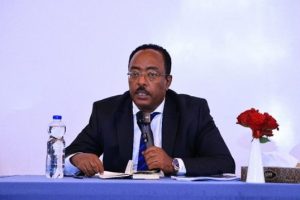Opening a discussion session on Homegrown Economic Reforms on Monday, Prime Minister Abiy Ahmed told development partners and diplomatic community that his government laid out the vision of homegrown economic reforms agenda which he said will propel Ethiopia to become the African icon of prosperity by 2030.
Abiy also said that the government pins its hope on unleashing the success of key sectors such as agriculture, manufacturing, mining and ICT anchor in the vision for building a prosperous nation.
“Our priority is to create economic environment that closes income inequality gap by creating opportunity and access of sources for all our youth,” he added.
The economic reform unveiled recently aims to redress challenges and sustain the economic growth witnessed over the last years. The planned reform also seeks to bring changes on macroeconomic, structural and sectorial spheres.
The reform also targets to create jobs, inclusive growth, and ultimately reduce poverty. Arresting inflation, strengthening financial sectors, according priority to agriculture, manufacturing, and mining are some of the issues received due attention.
The country has backlogs of economic challenges and some of them are pressing. This calls for swift and effective reforms, says Dr. Abdiyuya Ahmed, an Economist adding that using the enormous social capital and revising policies are strategies; the government should work to overcome the economic burden.
“Rising costs of living, shortage of foreign currency and unemployment have been taking their toll on the country. It is time that government moves its focus to economic reforms. It is those economic challenges which make the road to reform bumpy.”
The country has largely youth population with more desire to grow. This is both a
blessing and burden as well. Unless the government is able to create massive jobs or create conducive environment, unemployment will be remaining a pressing problem.
Besides, domestic ones, international experiences and policies as well as strategies should also be used in consideration of local contexts. Achieving structural changes in the economy has been the hardest task which the government now needs to make a last ditch on, Dr. Abdiyuya underscores.
Agriculture is still the mainstay of the country. So, each economic policy should also focus on enhancing productivity; and structural change must also be ensured within every sector including the agriculture. Boosting the manufacturing sector such as agro-processing should also receive due emphasis.
The need to triple per capital GDP to
reach low-middle income level, reducing poverty by half, curbing the rapidly increasing external debt, expansionary fiscal policy crowding out private sector and galloping inflation rate that now stands at 15 percent are among the challenges that necessitated the economic reform, Dr. Eyob Tekalegn State Minister of the Ministry of Finance said recently.
Cutting spending and maximizing export income should also be on the cards to ease economic burden. Lavish spending has been playing its negative part while low export income forcing the country to look for loans for foreign currency sources,” says Dr. Getu Tesso President of Oromiya Economic Commission.
The government should either reduce costs or increase incomes, Dr. Gutu says adding: “Increasing remittance has to be another priority area in which the government should put due emphasis on,” he underscores adding “restrictive public-sector policies, especially on completing ongoing projects and prudent budget execution are also useful to deal with the acute shortage of currency. Attracting FDI and increased formal inflow of remittance from the diaspora may also help ease the problem.”
However, Dr Gutu says the government needs to equally pay attention to revise its policies and strategies of macro-economic reforms. It has been the way the economic policies adopted that led to the foreign currency crunch and debt distress. It is time to set clear economic path and come up with policies and strategies that can serve the country for decades to come.
Recently, National Planning Commission told Ethiopian News Agency that domestic policies and strategies have contributed to the rapid economic growth the country has been enjoying.
“These policies, strategies and programs at the beginning, are homemade; and they considered the country’s context. This means our great assets are land and human resources. The policy, strategy and program, therefore, originated with considering such driving forces, “said Getachew Adem, National Planning Commission Deputy Commissioner with the rank of State Minister.
The quality of education, infrastructures development and efforts exerted to export value added commodities are mentioned among the next major focus areas to be addressed.
“Now agriculture is the dominant source of growth so far. For the growth to be more sustainable, structural change should be ensured within every sector including the agriculture”.
The Ethiopian Herald Sept 13/2019
BY DESTA GEBREWHIWOT





